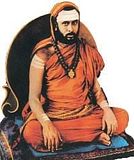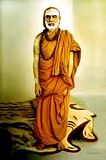Re: guru kripA vilAsam (On the Greatness of the Guru)
pages 101-105
As soon as sandhyA-kAlam--the time of dusk, came in-samIpam--vicinity, giving phala-mantrAkShata--rice grains in the spell of blessings, SannidhAnam permitted them to leave, saying, "parama-santoSham--much happiness for me. You (people) need not depart in a hurry. The vaNDi--vehicle (bus), scheduled for 5 o'clock would have left for Shimoga by now. Today is shukravAram--Friday (day of Shukra--Venus). So, you can have darshan of AmbAL and leave tomorrow."
As he listened to these words, shrI SatyamUrti, with tears flowing from his eyes, supplicated to the sage, "Today is a sudinam--auspicious day. My janma--birth, has become saphala--fruitful, today. All those doubts in my mind, that were not nivartana--removed, despite my asking many people, only today were removed. Should do anugraham--favour, for me to come back again and have darshan of SannidhAnam."
With a mandahAsam--gentle laugh, as SannidhAnam said, "Don't do-sampAdanam--earn, of many sandehams--doubts, and come", SatyamUrti started leaving with the words,
"स्थितोऽस्मि गतसंदेहः करिष्ये वचनं तव
sthito&smi gatasaMdehaH kariShye vachanaM tava
I am now firm, free from doubts. I shall carry out your orders.
sthita | asmi | gata-saMdehaH | kariShye | vachanaM | tava
firm | I am now | free from doubts | (shall) carry out | orders | (of) yours."
When SannidhAnam quipped, "Fine, at least you did not say
गतोऽस्मि स्थितसंदेहः
gato&smi sthitasaMdehaH
I am going, but my doubts remain (firm)
so, that itself is saMtoSham--happiness, (for me)", all of us had a hearty laugh, feeling happy about his rasikatvam--sense of humour.
Taking leave, shrI SatyamUrti and his ghoShTi--group, finished their sandhyAvandAdi kAryas on the banks of Tunga(badra) and went to the AmbAL Alayam. But then one of them wanted to return home due to some urgent work, so he went to the Shringeri bus stand and inquired. He came to know that the bus to Shimoga had left and that a bus to NarasiMharAjapuram was ready to leave, so he boarded that bus. When the bus was in the vicinity of NarasiMharAjapuram, it met with an accident, and tilted sideways. Many people suffered injuries. As it had rained heavily that day, the road was damaged in many places. The bus that left for Shimoga too met with the same fate, with injuries of many of its passengers. All these things were known to SrikaNTha ShAstrigaL by a telegram he received on the next day.
Except for the man involved in the accident that day, did we not say that all others in SatyamUrti's goShTi, obeying SannidhAnam's orders, went to have darshan of Goddess ShAradAMbAL? They got divya--wonderful, darshanam, that day. Because of some sAvukAra's--zamindar's, prArthana--prayers/vow, shrI ShAradAMbAL's utsava-mUrti--image taken in procession, came in bhavani--procession, around the Alayam--temple, in a silver chariot on that day. Witnessing that kaNkoLLA--(Tamizh) eye-widening/wonderful, sight, everyone went in to paravasham--self-obliterating happiness. They discussed among themselves, "Since we stayed here without going to Shimoga, obeying SannidhAnam's orders, we had this divya-darshanam, is it not so? Had we gone to Shimoga disobeying his orders, would this bAghyam--fortune, be had by us?"
At the samayam--time, of dIpArAdhana--worshipping with lamp, SannidhAnam too had come to shrI ShAradAMbAL's sannidhi for darshan. When he came out finishing dIpArAdhana and prArthana, SatyamUrti and his goShTi again paid their vandanam--respects, to him. Giving with his divya-hastam--divine hand, the kumkuma-prasAdam and the champaka flowers in abundance to shrImAn SatyamUrti, shrI SannidhAnam told him with a mandahAsam, "You people may get back to your places in saukhyam--comfort, tomorrow", and left the place. They discussed, "Had we gone to Shimoga, would we have received all these bhAgya?" But then what did they know about the accident that the bus met with en route?
On the next day morning, after finishing their snAna sandhyAvandanAdi, when they were starting to go to the bus stand, as SriKaNTha ShAstrigaL's sevaka--servant, appeared before them and said, "ShAstrigaL wanted you to come and meet him. There is still time for the bus, so you can have a talk for five minutes and then go", they all went to ShAstrigaL's office room. ShAstrigaL showed them the two telegrams received by the MaTham and said, "You need not be in a hurry. The road is getting repaird. Because of the rain yesterday, pits had formed in some places. The repair work will be over by this afternoon. You have your ahAram--food, here and then leave in the afternoon. I shall arrange to get you dropped in the MaTham's car." Hearing this, they were in avasthA--state of mental suffering, being happy on one side but worried on the other.
They were seized of the worry, "Suppose the news that both the buses that left yesterday had met with accidents because of the landslides was vAstavam--real, and a man of their ghoShTi--group, was involved in an accident, what to do then?" They also thought, "Had we all gone to Shimoga as per our plan yesterday, we too would have been involved in that accident."
It was mentioned in one telegram received by ShAstrigaL, "Since the roads in both routes are damaged, let no bus or car pass through them until afternoon. By that time the road will be repaird, so the vehicles may pass through thereafter." In the other telegram was mentioned, "The buses involved in yesterday's accidents are getting repaired". After seeing this telegram their worry was aggravated; and they were restless, being unable to speak it out. Whereas ShAstrigaL was doing-kushala-prasnam--inquiring health and welfare, with them, asking, "Did you have darshan of SannidhAnam? Got his anugrahas?"
What shrI SatyamUrti told him by way of reply was:
"You people know well that I am one who is busy with the affairs of the Congress party. I came to Bangalore from Chennai to attend a Congress committee meeting. Where I came I heard that some yajna was performed in Shringagiri, that it was done under orders from SannidhAnam, that before it was completed, it rained everywhere, and that with the rains which were awaited for the last three years having come now, it was subhiSham--abundance of food, throughout the Mysore rAjyam. I decided within myself that even for the rains and the subhikSham in the Chennai rAjyam, that should have been the reason. I also decided to have darshan of Shringagiri MahASannidhAnam, who was the kAraNabhUta--cause, for all these good things. I have visheSha priyam--special interest, in Bhagavad GItA. This should have arisen seeing how mahAns--great people, like MahAtma GAndhi and LokamAnya Tilak adore the GItA with much support. But then I did not know before now, that this greatness for GItA arose because our BhagavadpAdAL has done a bhAShyam--commentary, for it. Only by the words of upadesham graced by SannidhAnam yesterday, I realized the mahiman--greatness, of that bhAShyakAra--commentator, of the GItAchArya and the GItA. For me, due to my pitA's--father's, nirbandham--insistence, some SaMskRta-vAsana--interest in Sanskrit, arose in bAlyam--boyhood. It was my habit to do vichAram--inquiry, often, using that interest and Tilak's 'GItArahasyam'. The many sandehas--doubts, that arose in that book, I got cleared by asking many vidvAns--experts. Although some sandehas were nivarta--removed, for some others I could not get proper replies. Since the thought arose that I could inform SannidhAnam about those doubts too and get the answers, I came to Shringagiri. Coming here, I experienced the heavy rains as well as the rains of upadesham and become kRtArtha--one who has accomplished a desire."
ShAstrigaL:- What is the reason for you coming alone first and then these people coming thereafter?
SatyamUrti:- Only the thought that if I came alone first, I could get ekAnta--private, darshan and it would be saukaryam--practical, to get my sandehas in GItA clarified.
ShAstrigaL:- The other people too came only for darshan of SannidhAnam?
SatyamUrti:- That is what they say now. But in vAstavam--fact, they only came to have darshan of me (laughing).
ShAstrigaL:- They already had darshan of you in Bangalore. What other kAryam--task, here?
SatyamUrti:- They came here only for a big kAryam--task. But it was not accomplished because of me. We think that it is accomplished now, and that by SannidhAnam's anugraham--divine favour.
ShAstrigaL:- You are giving me some sort of a riddle. Shouldn't I get to know about it? This was why you left in the morning without even informing me?
SatyamUrti:- We came only to have darshan of SannidhAnam. It was over. So we started to leave, that's all.
ShAstrigaL:- It is customary for celebrities like you, when they come here, to have darshan of SannidhAnam and then come to me for at least some saMbhAShaNa--conversation. Whereas you left for the bus stand without coming here (to my office), can you do this way?
...to contine this chapter...
रत्नाकरधौतपदां हिमालयकिरीटिनीम् ।
ब्रह्मराजर्षिररत्नाढ्यां वन्दे भारतमातरम् ॥
To her whose feet are washed by the ocean, who wears the Himalayas as her crown, and is adorned with the gems of rishis and kings, to Mother India, do I bow down in respect.
--viShNu purANam





 Reply With Quote
Reply With Quote



Bookmarks